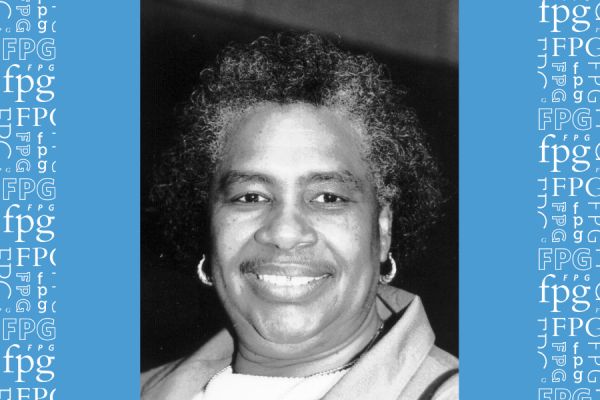
Remembering Carrie Davis Bynum
 Carrie Davis Bynum, a long-time member of the FPG community, passed away on November 22, 2021 at the age of 87. Her work and spirit will live on at the Institute.
Carrie Davis Bynum, a long-time member of the FPG community, passed away on November 22, 2021 at the age of 87. Her work and spirit will live on at the Institute.
A social worker by training, Bynum was one of the first teachers in the FPG child care program. Using her extensive community contacts, she soon became a resource for recruitment of families and children into the Abecedarian Study.
Bynum later became the head of the FPG nursery program and continued to be part of the nursery/preschool staff until she became the lead home visitor in FPG’s Carolina Approach to Responsive Education (Project CARE), which ran from 1977 to 1982. She kept extensive records on the Abecedarian and Project CARE samples, keeping in touch with families so that the data collection team was able to locate everyone over the 30-year period during which the work was based at UNC Chapel Hill.
“One of Carrie’s most striking features was that she genuinely seemed to love everyone with whom she came into contact,” shared former colleague and Abecedarian PI, Frances Campbell, PhD, “her charity extended to all who needed her help.”
It is difficult to say when Bynum officially retired from FPG because she continued to work with Craig Ramey, PhD, a PI on the original Abecedarian study, and Sharon Landesman Ramey, PhD, a project contributor since 1987, on the 40-year follow-up of the Abecedarian study.
“She had a wonderful sense of humor and loved to have fun,” said Donna Bryant, PhD, a senior research scientist at FPG. “She was respected for her tireless good works and loved for her big heart.”
In 1985, Bynum was honored with the University’s C. Knox Massey Award for Distinguished Service. The archive of that award reads:
As of 1985, Carrie D. Bynum had served the University for 18 years, recruiting families to participate in the Frank Porter Graham Child Development Center’s program of research and child care and nurturing them in their relationship with the University.
In her award citation, Bynum was praised for contributing to her work “the glue of humanity, love and concern that … held many of these families together.
“Whether training and counseling parents of high-risk children in her own home or giving leadership and wisdom to the whole program, she has taken on a load of uncompensated work in her church, in the public school and in community social services that would, by itself, constitute full-time activity for a person who did not have a job.”
At her funeral, Bynum’s minister called her an “icon”—a sentiment all who knew her at FPG would wholeheartedly confirm.
